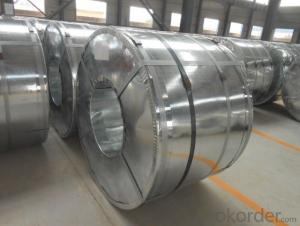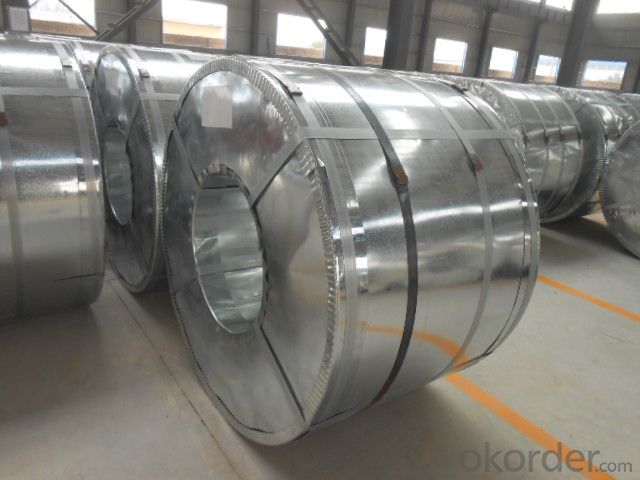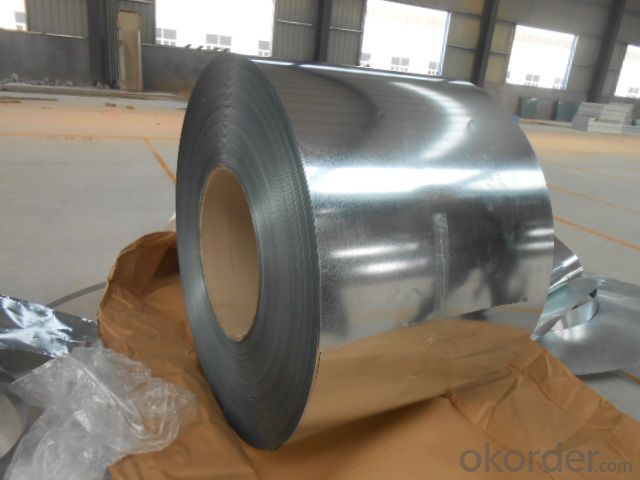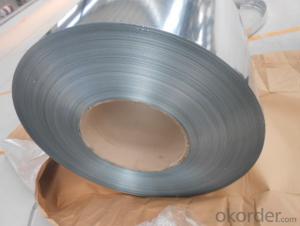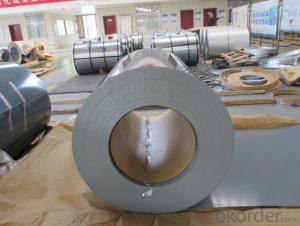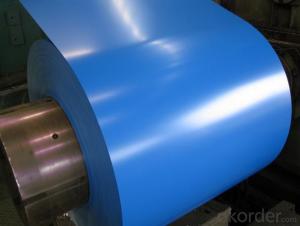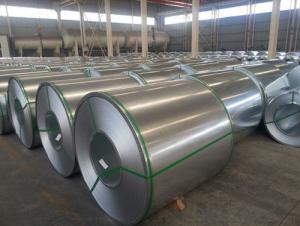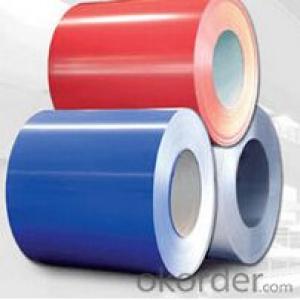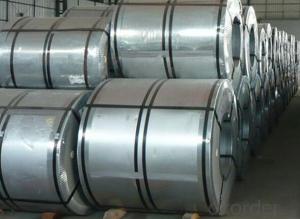STEEL COIL SGCC
- Loading Port:
- China Main Port
- Payment Terms:
- TT OR LC
- Min Order Qty:
- -
- Supply Capability:
- -
OKorder Service Pledge
OKorder Financial Service
You Might Also Like
Prime Galvanized steel coil
Packaging & Delivery
Packaging Detail: seaworthy export package
Delivery Detail: on request
Specifications
1. more than 10 years’ experience on this field
2. advanced equipments
3. competitive price
4. soonest delivery
Product Description :
Commodity
Hot dip galvanized steel coil
Technical Standard:JIS 3302 / ASTM A653 / EN10143/ GB/T 2518
Grade:DX51D/ S250,280,320GD,SGCC,SGHC,SGH340,SGH400,SGH440,G450,G550
Types:Commercial / Drawing / Deep Drawing / Structural quality
Width: 900mm/1000mm/1219mm/1200mm/1220mm/1250mm
Thickness: 0.2mm~4.0mm
Type of coating: galvanized
Zinc coating: Z40-275g/m2,Z40-Z450g/m2
Surface treatment:zero spangle / regular spangle/ big spangle
ID coil: 508mm or 610mm
Coil weight: 3-10/MT per coil
Package:Properly packed for ocean freight exportation in 20''container
Application::home appliances, constructions, building, machineries
Our Advantages :
1. Expertise:
More than 10 years of manufacture: we know how to properly handle every step of production.
2. Competitive price:
We can offer competitive prices to our customers.
3. Accuracy:
We have excellent technicians and leaders, which can ensure our products are exactly what you want.
4. Materials:
All galvanized steel coils are made of high-quality raw materials.
5. Certificate:
Our products are certified by ISO9001.
6. Productivity:
We have large-scales of production lines,, which can guarantee all your orders will be finished in earliest time.
Hr CGL Technical Process:
Coil loading-> uncoiling-> cutting-> welding-> entry accumulator-> Heating and deoxidization-> galvanizing-> air cooling->water quenching-> air dryer-> tension leveler-> Passivation->air dryer->exit accumulator-> oiling-> cutting-> recoiling->coil unloading-> packing
The furnace heating style: improved Sendzimir heating technology
Hourly output: max.76.3t/h
Process after coating: tension leveling, Passivation or oiling
Our Service
Our quality
Test Equipments of Prepainted Galvanized Steel Coil : Salt-spray tester; Atomic absorption spectrophotometer; Rockwell typer hardness tester; Tensile test machine; Metrohm titration; Laboratory Bend test machine.
Our packing
Properly packed for ocean freight exportation in 20''container, galvanized metal fluted rings on inner and outer edges, galvanized metal & waterproof paper wall protection disk, galvanized metal & waterproof paper around circumference.
R&D department
R&D department concentrates on researching and developing reliable products with best quality. The quality department test and control every process of production to guarantee the best quality of product- Q: I have a belly button piercing and the metal is stainless steel.. I was wondering does it develop rust whenever you go shower and clean it? Can I still swim in the summer with it or do I have to take it out? What happens if I swim in the pool with it?
- No it won't rust. Just make sure to get the pool water out of the piercing when done at the pool. Just to avoid drying out the skin too much.
- Q: Where can I find a discount online for Stainless Steel Magnetic Knife Rack
- listed under are a number of them: 5.0 out of 5 stars could no longer be extra effective, March 3, 2006 by applying Denise M. Henderson (Groveland, CA united states of america) stable sturdy shape. seems great. common installation. appropriate length. Magnet appropriate capability. only confirm you place the back of the blade to the magnet first, then turn the knife flat onto the magnet. or you will cut back to rubble the knife blade. 5.0 out of 5 stars purchase it!, November a million, 2004 by applying T. Berktan (Le chef amateur) (Chicago, IL) i admire this knife holder. at first it rather is sanitary. would not take counter area and IT seems SO COOL on the wall. i might purchase it lower back with out hasitation if I had to. 5.0 out of 5 stars Very clever and seems great!! i like it!!, August 24, 2005 by applying Stacy S. Wooten i in my opinion, rather like this knife holder. It replaced into common to place up and seems great on my kitchen backsplash. it rather is long sufficient to hold all my knifes (approximately 8). it rather is a competent, stable magnet, and seems very stylish in my kitchen. i might surprisingly propose this product to everyone searching for a magnetic knife holder.
- Q: How are steel coils inspected for weldability using welding tests?
- Steel coils can be inspected for weldability using various welding tests. One common method is the bend test, where a sample of the coil is bent to evaluate the ductility and resistance to cracking. Another test is the tensile test, which measures the strength and elongation of the steel under tension. Additionally, the charpy impact test assesses the steel's toughness by measuring its ability to absorb energy during impact. These tests help determine the suitability of the steel coils for welding applications and ensure the quality of the welds.
- Q: How are steel coils used in the production of electrical systems?
- Steel coils are used in the production of electrical systems as they serve as the key component in the construction of transformers and electric motors. These coils are wound with insulated copper wire and when an electric current passes through them, they generate a magnetic field that enables the conversion of electrical energy into mechanical energy or vice versa.
- Q: which type of carbon steel does not have manganese
- None. Mn is a trace impurity in all steels, if you look carefully enough. If you want to find a steel where Mn is not intentionally added, start looking at the alloy composition specifications, there are hundreds of steels. Why are you worried about Mn? Mn is typically added to steels for a very good reason.
- Q: What are the common applications of galvanized steel coils?
- Galvanized steel coils are commonly used in various applications such as construction, automotive manufacturing, electrical appliances, and infrastructure projects. They are used for manufacturing roofing sheets, wall panels, pipes, gutters, and various structural components due to their corrosion resistance and durability. Additionally, galvanized steel coils are widely used in the production of automotive parts, such as body panels, frames, and chassis, as they provide excellent strength and protection against rust.
- Q: What are the common coil diameters available for steel coils?
- The common coil diameters available for steel coils typically range from 24 inches to 72 inches.
- Q: How do steel coils contribute to the aerospace industry?
- Steel coils contribute to the aerospace industry by being used in the manufacturing of various aircraft components such as engine parts, landing gear, and structural elements. The high strength and durability of steel make it a preferred material for these applications, ensuring the safety and reliability of aircraft. Additionally, steel coils are also used in the production of specialized tools and equipment required for aerospace manufacturing processes.
- Q: I'm quite confused...i watched all of steel angel kurumi (the 28 episodes) and then continued to steel angel kurumi zero. it was an entire different story line with only the steel angels being the same. the world is different the guys are different, and there is a new character. Even the humor is gone. its like a whole different series. So what gives, what is the relationship between them?
- Steel Angel Zero is an OVA (Original Video Animation), a very short animation that went straight to DVD. It probably was written because Kurumi was so popular, and the producer wanted to check the waters for whether they should make a second season. It's pretty hard to keep track of what anime is which, especially in the more popular series. If you think Zero is worth zero, try Steel Angel Kurumi 2 (anime, 12 episodes), and Steel Angel Kurumi Encore (OVA, 4 episodes) as well.
- Q: Hey everyone.I have a whetstone and a honing steel. I purposely tried to make one of my knives less sharp twice to see how well the whetstone and honing steel would work.It even seemed that when I was using my whetstone it wasn't as sharp as it was when I used my honing steel, but when I also used my honing steel after having sharpened my knife on the whetstone, it was razor sharp.I was wondering, is the whetstone only supposed to be used when the knife edge isn't as flat anymore or something? Like, only when it doesn't really have an edge anymore?Please explain your answer.Thanks everyone.
- You're not supposed to use the whetstone alone. It leaves a burr, which the steel removes. If you google using a whetstone, you'll see plenty of info. It is possible to use a finer stone in place of the steel.
Send your message to us
STEEL COIL SGCC
- Loading Port:
- China Main Port
- Payment Terms:
- TT OR LC
- Min Order Qty:
- -
- Supply Capability:
- -
OKorder Service Pledge
OKorder Financial Service
Similar products
Hot products
Hot Searches
Related keywords
